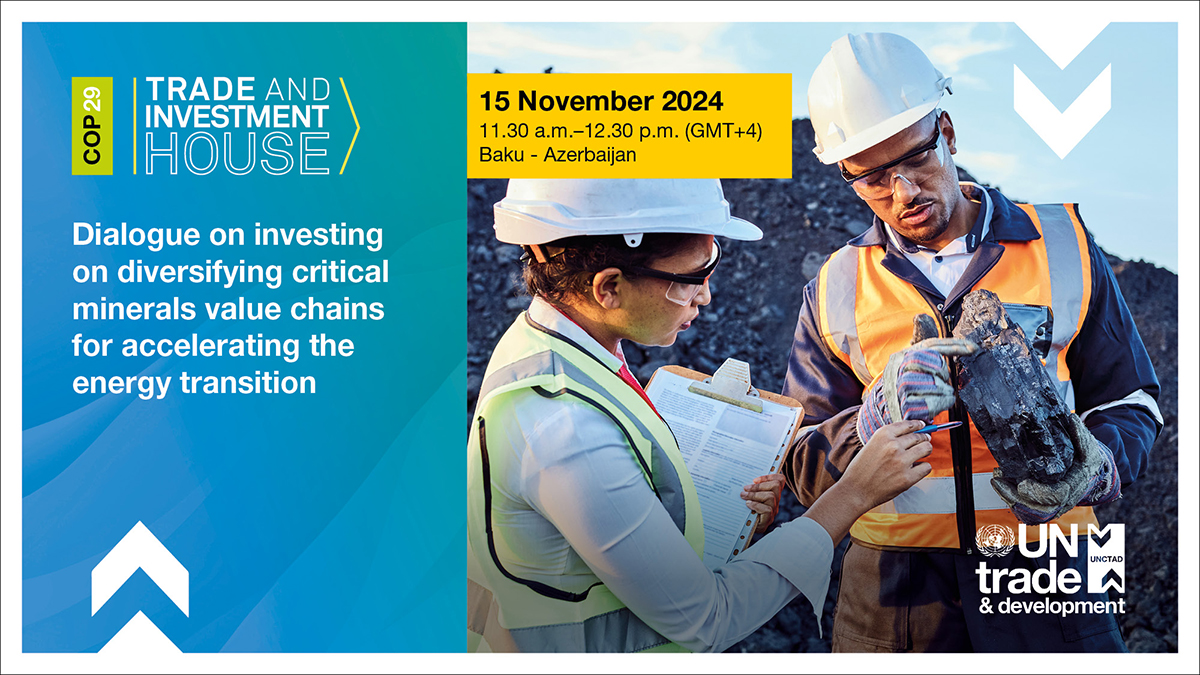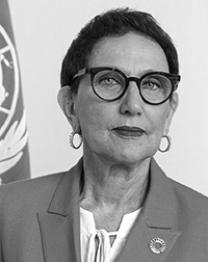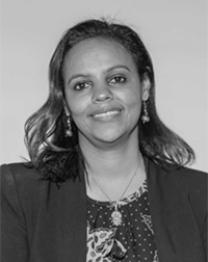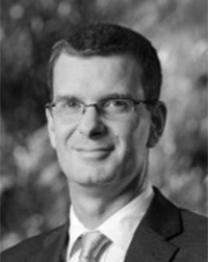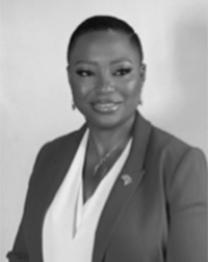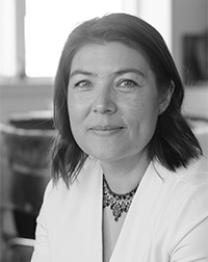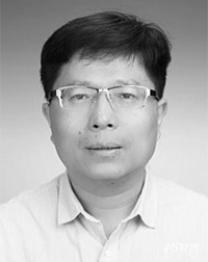As the climate crisis intensifies, demand for the minerals needed to manufacture clean energy technologies is surging. According to the International Energy Agency, global demand for minerals like lithium – vital for electric vehicles – is set to triple by 2030 and quadruple by 2040.
The accelerating energy transition and rising demand for critical enegry transition minerals (CETMs) call for investment that goes beyond extraction.
To ensure fair and equitable benefits for developing countries rich in these minerals, diversification and value addition in midstream and downstream activities are essential.
Objective
The objective is to identify strategies that ensure investments in CETM-producing countries not only meet the immediate needs of the energy transition but also contribute to their long-term sustainability and mitigate the environmental impacts associated with mining.
The event will examine strategies to diversify the critical energy transition minerals (CETM) supply chain, as the market is expected to tighten by the end of the decade, and enhance the critical energy transition minerals value chain in developing countries. This aims to meet the growing demand driven by clean energy technologies, ensuring inclusiveness and sustainability.
- Supporting CETM-producing developing countries to add value to their minerals is crucial for enabling them to break free from the constraints of commodity dependence and achieve long-term sustainable development.
- By focusing on upstream, midstream and downstream diversification while addressing environmental challenges, these countries can develop a more integrated and resilient minerals value chain that not only increases their share of the global market but also enhances local economic growth.
- Additionally, side-stream diversification – leveraging the by-products and associated industries of sustainable mining – can further create new opportunities across various sectors. Through value addition and diversification, the entire value chain becomes more resilient and scalable, better equipped to meet global demand fluctuations.
The session will also underscore that sustainable finance is essential to developing the infrastructure and capacity needed to responsibly exploit, process and add value to these minerals and develop related industries along the value chain.
- Investment is essential to promote this diversification, as it facilitates the development of infrastructure, technology and skills. With these elements in place, resource rich countries can move beyond mere extraction and into the processing and manufacturing of value-added products, such as batteries and renewable energy components, within their borders.
- Participants will discuss the importance of creating financial mechanisms that support long-term investments in mining, processing, and industrial infrastructure in developing countries.
Additionally, the session will explore tailored investment approaches that consider the unique challenges of each country, particularly those that have rich mineral resources but lack the infrastructure and stable regulatory environments necessary to attract investment.
Rebeca Grynspan, of Costa Rica, became UNCTAD's eighth Secretary-General on 13 September 2021 and is the first woman to lead the organization.
Prior to her UNCTAD appointment, she was the Ibero-American secretary-general from 2014 to 2021, also the first woman to head the organization. During her mandate, she has coordinated the 22-member Iberoamerican Conference and led four key summits of Heads of State and Government.
In 2010 she was appointed Under-Secretary-General of the United Nations and Associate Administrator of the United Nations Development Program (UNDP) and prior to that was UNDP Regional Director for Latin America and the Caribbean.
Prior to joining the United Nations, Ms. Grynspan served as Vice-President of Costa Rica from 1994 to 1998. She was also Minister of Housing, Minister Coordinator of Economic and Social Affairs, and Deputy Minister of Finance. In 2021 she was named Special International Advisor to the newly created Economic and Social Council of Argentina and invited to join as member of the G20 High-Level Independent Panel on Financing the Global Commons for Pandemic Preparedness and Response.
In addition to her experience as a lecturer and advisor to several international organizations, she has been actively involved in key United Nations initiatives, such as the Millennium Project's Task Force on Poverty and Economic Development and the High-level Panel on Financing for Development.
In 2014 and 2015, she was recognized as one of the 50 leading intellectuals of Latin America. And she was recognized as one of the 100 most powerful women in Central America by Forbes magazine.
Ms Grynspan holds a degree in Economics by the University of Costa Rica and a MSc in Economics by the University of Sussex. She has been awarded a Doctorate Honoris Causa by the University of Salamanca, the University of Extremadura and the European University of Madrid in recognition of her outstanding professional achievements.
Ms. Marit Kitaw, PhD, is the Interim Director of the African Minerals Development Center (AMDC), a specialized agency of the African Union dedicated to implementing the Africa Mining Vision (AMV). She has extensive experience, having served as Chief Technical Advisor on Extractive Industries for Sustainable Development at UNDP Mozambique, Economist leading the Minerals portfolio at UNECA, and in roles at COMESA, AfDB, and the U.S. Institute of World Affairs. As a founding staff member of AMDC, she contributed to the development of key instruments for implementing Africa’s minerals-for-development agenda. Dr. Kitaw currently represents the African Union on the United Nations Secretary-General's Panel on Critical Energy Transition Minerals (CETM). She is also a member of the 2025 Advisory Board of Mining Indaba. She holds a PhD in Economics from the University of Nice/Sophia-Antipolis in France and an MBA in Leadership and Sustainability from the University of Cumbria, UK.
Anna Shpitsberg is the Chief Climate Officer at the US Development Finance Corporation (DFC), where she leads the agency’s climate team and strategy. She is a clean energy investment, power markets, energy policy, and international development specialist. Throughout her career, she has guided companies on growth strategies, investment reviews, and decarbonization options; supported utilities and regulators undergoing energy reforms and procurements in over 30 countries; and aligned with policymakers seeking to strengthen clean energy deployment and supply chains.
In her prior role, Shpitsberg served as the Deputy Assistant Secretary for Energy Transformation at the U.S. Department of State. In this role, she led the creation and management of the Clean Energy Demand Initiative and the Mineral Security Partnership to increase investment in critical infrastructure and supply chains.
Before joining the Department of State, Shpitsberg served as Director for Global Power and Renewables at IHS Markit, where she co-led the power and renewables service product; advised executives on trends that impact their business strategy; led corporate renewable research, including the outlook for the United States; consulted on renewable transactions; and managed the buildout of power market analysis in Africa and the Middle East. Shpitsberg also established and managed the U.S. Department of State’s Power Sector Program that partners with and advises utilities, regulators, system operators, and ministries across the world.
Ms. Shpitsberg holds a BS from Binghamton University in Finance and an MEM in Environmental Economics and Policy from Duke University with a focus on power systems and the energy-water nexus.
Mr. Hill is an Advisor focusing on just energy transitions advocacy at NRGI. He has 30 years of experience working at the nexus of international climate and development issues. He has followed the UN climate change process closely since 1992, and worked on a range of climate action issues including carbon markets, adaptation, and climate finance. He has advised and supported several governments in Latin America, while working primarily with third sector organizations. Mr. Hill holds a MSc in Development Studies from the London School of Economics and Political Science, a BA in Asian Studies and Government from Dartmouth College, and a certificate in Macroeconomic Policy from the Brandeis International Business School.
Gyubin Hwang is the Global Coordinator of the Children and Youth Major Group to UNEP, the mandated youth constituency to the UN Environment Assembly. Since 2020, he has worked to broaden the constituency’s reach in areas including science-policy interfaces, chemicals and waste, and resource management. His professional career has focused on energy investment and critical minerals analysis. He holds degrees from University College London and the University of Oxford.
Jonathan Dunn OBE has responsibility for climate strategy development and implementation across the Anglo American group. This includes emissions mitigation, climate engagement and advocacy, building the company’s resilience to a changing climate and drawing together different parts of the group to ensure the company is contributing to a Just Transition.
Previously, Jonathan worked in Anglo American’s Corporate Relations team, leading on UK Government Relations and building an advocacy strategy in relation to critical minerals policy. Prior to joining Anglo American in 2018, Jonathan served as a British diplomat for 21 years, during which time he spent four years in Hanoi, Vietnam and eight years in Brazil (five in Brasilia and three in Rio de Janeiro). His time in Rio coincided with the Rio 2016 Olympic and Paralympic Games and Jonathan led the UK Government’s work on the Games, receiving an OBE from HM Queen Elizabeth for this work.
Jonathan holds a bachelor degree in geography from the University of Sheffield and is based in London.
Lisa Sachs is the Director of the Columbia Center on Sustainable Investment (CCSI), a joint Center of Columbia Climate School and Columbia Law School. Since joining CCSI in 2008, she established and oversees CCSI’s interdisciplinary research and advisory work on the alignment of investment law, practice, and policy with the Sustainable Development Goals. She is a globally recognized expert in the ways that laws, policies and business practices shape global investment flows and affect sustainable development. She works with governments around the world, regional and international development organizations, financial institutions, companies, civil society organizations and academic centers to understand the inter-relations of investment flows and sustainable development, and to influence investment policies and practices to promote the SDGs and the Paris Agreement. She received a Bachelor of Arts in Economics from Harvard University, a Master’s degree in International Affairs from Columbia’s School of International and Public Affairs, and a Juris Doctor degree from Columbia Law School, where she was a James Kent Scholar and recipient of the Parker School Certificate in International and Comparative Law.
Ms. Oluranti Doherty is Managing Director, Export Development Division at African Export Import Bank (the “Bank”). In her current role, she oversees the Bank’s products programmes and initiatives that support long-term financing interventions to facilitate the development of projects in light and heavy manufacturing, agro-processing, extractives, trade enabling infrastructure, hospitality and healthcare sectors.
She has over 22 years’ work experience that cuts across financial advisory, project finance, project development, credit analysis and structuring. Ms. Doherty is an alumnus of the IMD Business School, Lausanne, Switzerland; University of Leicester, United Kingdom; and Olabisi Onabanjo University, Ogun State, Nigeria. She is also a Fellow of the Institute of Chartered Accountants of Nigeria (ICAN).
Sara Olsvig is the International Chair of the Inuit Circumpolar Council. Olsvig is a long-time Indigenous Peoples’ rights and human rights defender, and a politician who has served as member of the Parliament of Denmark (2011–2015) and the Parliament of Greenland (2013–2018). Sara Olsvig actively contributed to the work of the Constitutional Commission of Greenland as well as the Human Rights Council of Greenland. She recently served as a member of the UN Secretary General’s Panel on Critical Energy Transition Minerals, delegated by the UN Permanent Forum on Indigenous Issues. Olsvig holds a Master of Science in Anthropology and is currently a PhD candidate, Institute of Social Science, Economics & Journalism at Ilisimatusarfik - University of Greenland. Olsvig is a recipient of the 2023 Womenomics Inclusion Award. Sara Olsvig is Inuk, and was born in Nuuk, Greenland, where she resides with her partner and their children.
Chen Zhenyu, PhD in Geology, is currently a researcher of Institute of Mineral Resources, Chinese Academy of Geological Sciences, Director of Mineralogy Department. He is mainly engaged in the research of genetic mineralogy, prospecting mineralogy and process mineralogy of critical metal deposits. He is also the Secretary General of Mineralogy Committee of Geological Society of China, Secretary of New mineral and mineral nomenclature Committee of Mineralogy, Petrology and Geochemistry Society of China, Vice Chairman of the National Microbeam analysis Standardization Technical Committee. He is a member of the UN Secretary-General's Panel on Critical Energy Transition Minerals.

